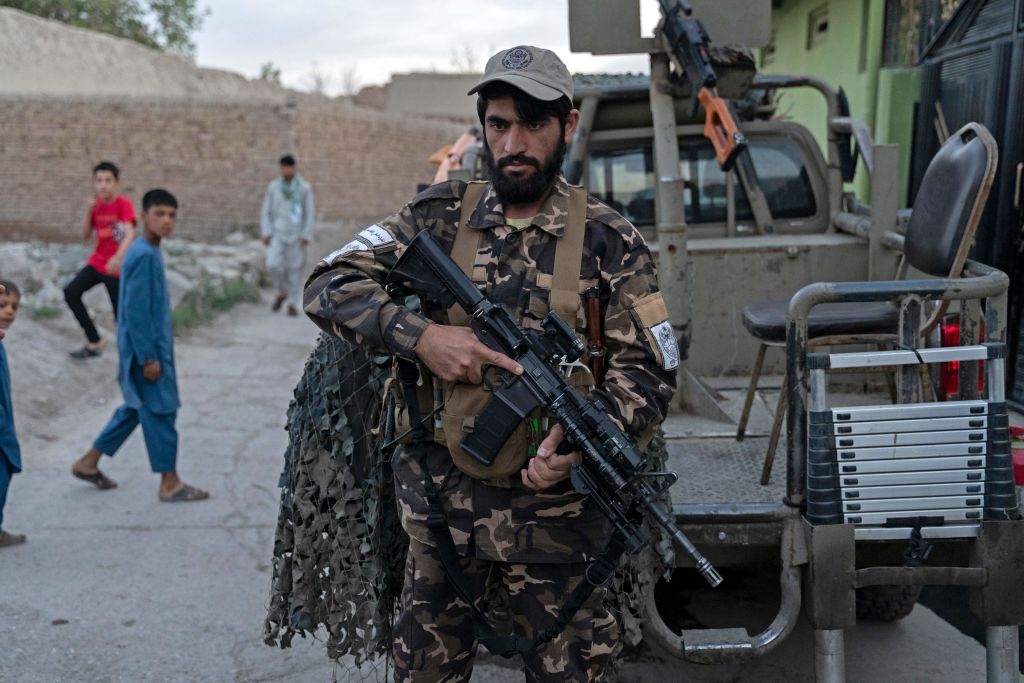Hibatullah Akhundzada is a secretive man who is only occasionally heard and seldom seen. But on May 1, the Taliban’s supreme leader was delivering a sermon in Kandahar’s central mosque, bragging about his organization’s supposed successes.
“Congratulations on this victory, freedom and success,” said the reclusive Akhundzada, surrounded by armed bodyguards. Nine months after the Taliban captured Afghanistan and forced the hapless Ashraf Ghani to flee the country in a helicopter, its chief official remains content with relishing the past.
But truth be told, the Taliban has nothing to brag about. The group learned fairly early that overthrowing a corrupt government that couldn’t extend its writ past a few major cities is not the same as governing a country of about 40 million people, the vast majority of whom are spending every minute of every day doing what they can to put food on the table. By any objective measure, the Taliban’s administration of Afghanistan has been as bad as the Afghan governments that came before it (and at least those governments had access to billions of dollars in foreign assistance every year).
Everywhere you turn in Afghanistan, there are problems. The economic situation is apocalyptic, with poverty nearly universal. With no work to speak of, Afghans are literally selling their children to scrounge up what little cash they can. More than 22 million Afghans don’t have enough to eat. Per capita incomes fell by one third in the months after the Taliban planted their flag in Kabul, canceling out all of the economic progress Afghanistan had made over the previous fourteen years (much of it thanks to a war economy).
The hundreds of thousands of young Afghans who enter the workforce every year don’t have much work to do, forcing a critical choice: stay put and try to eke out a living at home or leave their families and migrate in the hope of greener pastures. By the end of this year, Afghanistan’s $20 billion GDP will have contracted by a third. Of course, when a country is so reliant on foreign aid for so long, an economic depression is inevitable once that aid dries up.
The relative peace Afghans experienced in the first months after the end of the war is becoming more precarious. The Taliban have always thought of themselves as hard-edged security men who prize law and order, tolerate no dissent, and unapologetically punish anyone who dares to challenge their rule. A take-no-prisoners approach has helped the Taliban consolidate power; what was left of an organized opposition movement frittered early on, as Taliban forces squelched holdouts in the Panjshir Valley.
Bombings on soft targets, however, are more frequent today than they were last fall. The last two weeks have been especially bloody, with IS-K militants attacking multiple mosques and killing dozens of worshippers. Last Friday, fifty Afghans were killed after a suicide bomber struck a mosque in Kabul, which came a week after another strike against a Sunni mosque in Kunduz killed thirty-three. With every attack, confidence about the Taliban’s strength is further called into question.
The Taliban is experiencing headaches on the diplomatic front as well. The group’s nearly three-decade-long relationship with Pakistan is under strain, as Pakistani Taliban militants based in Afghanistan increase their pace of attacks across the border. Pakistani forces stationed in the tribal regions are finding themselves under fire, and Islamabad is getting irritated with the lack of cooperation from its former partners. Last month, Pakistan took matters into its own hands, conducting airstrikes against two Afghan villages. Those strikes killed dozens of civilians, eliciting an angry diplomatic protest from Taliban officials and threats from the Taliban defense minister.
The Taliban’s relationship with its neighbor to the west, Iran, is also delicate. The stabbing of several Iranian clerics at one of Shia Islam’s holiest mosques by an Afghan immigrant has resulted in a wave of anti-Afghan sentiment among Iranians. Afghan refugees and migrants in Iran have been beaten and assaulted in retaliation. Afghans have responded to these images with anger; the Iranian consulate in Herat was attacked by stone-throwing Afghans, forcing Tehran to suspend consular services in the country for ten days. Iran and the Taliban have sent additional reinforcements toward their shared border, even as diplomats on both sides seek a de-escalation.
Some may argue that none of the above would have happened if President Biden had kept the American military bogged down in an unwinnable war for another decade or two. Yet no one can confidently say that a longer troop presence would have made a difference in the grand scheme. Ashraf Ghani would still be an aloof head-of-state browbeating his subordinates; the Afghan government would still be relying on foreign donors for three quarters of its budget; the Taliban would still be holding significant ground outside the capital city; and IS-K would still be inflicting horrendous bloodshed against innocent people.
With the US now out of the country, managing Afghanistan’s multitude of problems is the Taliban’s responsibility. So much for the spoils of war.





















